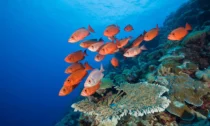
Palau’s waters contain some of the world’s richest marine biodiversity. Critically endangered hawksbill turtles and endangered Napoleon wrasse, which can grow up to six feet long and are known for the distinctive bulge on their foreheads, cruise through reefs home to hundreds of species of coral.
The country, an archipelago of over 300 pristine tropical islands popping up out of the Pacific, has tried hard to protect its natural gifts. In 2009, it forbade the commercial fishing of sharks, creating the world’s first national shark sanctuary. Species like dugongs and bumphead parrotfish are protected. Tourists have to pay a $100 green fee on entry to the country to support local conservation, and sign a pledge written by the children of Palau to “tread lightly, act kindly, and explore mindfully.” Sunscreen that has ingredients that are toxic to reefs is banned.
But perhaps its most ambitious conservation initiative is the Palau National Marine Sanctuary (PNMS). Any kind of extractive activity, including fishing, has been banned in the PNMS, an area bigger than California, which comprises 80% of Palau’s Exclusive Economic Zone (EEZ), since January 2020. Not only can so-called marine protected areas (MPAs) safeguard biodiversity and ecosystems but they are also important for the fight against climate change; they can prevent stores of seafloor carbon from being released from activities like trawling or resource extraction.
But the future of the PNMS—one of the largest marine protected areas in the world—looks uncertain. The government is now considering reducing the size of the PNMS to as little as 30% of the EEZ, in an attempt to increase economic activity to ease the hit COVID-19 has had on the country’s finances.
Palau’s struggle highlights questions of justice that countries around the world are facing as they grapple with how to balance biodiversity protection and climate action with economic growth: What contributions should developing nations have to make to protect biodiversity and the climate? Should they take a hit to their economic development, when climate change caused mostly by the world’s largest emitters, is the source of many of the ocean’s problems? Meanwhile, a global goal of protecting 30% of the world’s oceans means Palau is doing far more for ocean protection than most countries.
“Save our sanctuary!”
The plan to reduce the size of the PNMS has sparked heated debate in Palau. As the Our Ocean conference convened in Palau in mid-April, bringing together hundreds of officials, activists, and businesspeople from around the world to discuss ocean protection, a dozen or so youth activists, environmentalists, and fishermen gathered outside to protest the potential scaling down of the PNMS. “Save our sanctuary! We know you can do it,” they shouted as diplomats arrived in their black SUVs. “Fishermen Want the Sanctuary,” and “People Not Profit,” their signs read.












Social Profiles